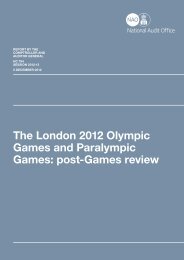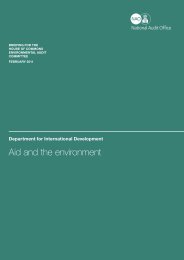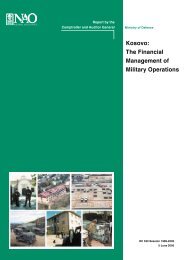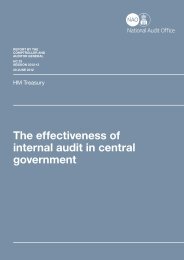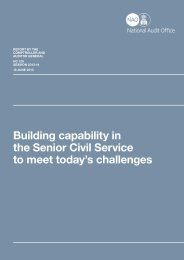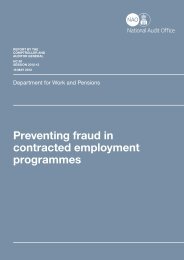summary8 While the <strong>Campus</strong> partners were rightly committed toovercoming obstacles, we believe the failure to have a criticalchallenge led to wasted and misdirected effort and expense.<strong>The</strong> Strategic <strong>Health</strong> Authority should have either requiredthat the <strong>Campus</strong> partners draw up a new OBC in early 2003or cancelled the <strong>Campus</strong> scheme. Cancelling the scheme atthat point would have freed resources and organisations todevelop other schemes. Developing a new OBC would, webelieve, have led sooner to the robust assessment <strong>of</strong> whetherthe partners could afford to build the scheme and address the:nnnmore than doubling <strong>of</strong> the forecast capital cost;absence <strong>of</strong> adequate land, in the light <strong>of</strong> planningconstraints; andlack <strong>of</strong> available funds to build the scheme.9 A further two years were spent exploring a variety <strong>of</strong>alternative schemes. In 2003 the <strong>Campus</strong> partners, stronglyencouraged by the Strategic <strong>Health</strong> Authority, developedOutline and Full Business Cases to acquire <strong>The</strong> Point buildingbeside St Mary’s hospital in 2003. From Summer 2004onwards the <strong>Campus</strong> partners developed a new OBC forthe whole scheme, at the request <strong>of</strong> the Chief Secretary tothe Treasury. In the event, in May 2005 the <strong>Campus</strong> partnerscould not agree a revised OBC.Summary <strong>of</strong> key findings<strong>The</strong> scheme partners underestimated the risksto the scheme10 <strong>The</strong> <strong>Campus</strong> scheme faced a number <strong>of</strong> significantrisks, due in part to its intrinsic complexity and thetimescale over which it was being planned. <strong>The</strong> timescaleitself led to additional risks due to the impact on designassumptions <strong>of</strong> new national policies for the NHSintroduced while the scheme was being developed. <strong>The</strong>serisks included project risks, in particular the mismatchbetween the size <strong>of</strong> the scheme and the land and fundingavailable, and the impact <strong>of</strong> ‘consumerism’ guidelines onspace in new hospital building schemes. <strong>The</strong>re were alsopolicy risks because <strong>of</strong> the change in the structure <strong>of</strong> theNHS, with the creation <strong>of</strong> Strategic <strong>Health</strong> Authorities andPrimary Care Trusts, and the implications for this scheme<strong>of</strong> Payment by Results and patient choice that could nothave been foreseen by the <strong>Campus</strong> partners.11 <strong>The</strong> <strong>Department</strong> <strong>of</strong> <strong>Health</strong> (the <strong>Department</strong>) iscurrently reviewing how the commissioning <strong>of</strong> majorcapital schemes through PFI can be reconciled withlong-term affordability and policies on choice, Paymentby Results and the movement <strong>of</strong> care away from acutehospitals to the primary care sector.12 Any one set <strong>of</strong> the above project or policy riskswould have been challenging. However, the layering <strong>of</strong>risks upon risks without adequate mitigation or an effectiverisk management strategy made the scheme particularlyvulnerable and reduced its chances <strong>of</strong> success.13 <strong>The</strong> <strong>Campus</strong> partners failed to address some <strong>of</strong> therequirements <strong>of</strong> the <strong>Department</strong>’s Capital Investment Manualin developing an OBC. For example, they did not draw upa risk register as part <strong>of</strong> the 2000 OBC or carry out a formalreappraisal <strong>of</strong> the 2000 OBC when its estimated capital costincreased by more than 10 per cent. Whilst the <strong>Campus</strong>partners drew up ‘snapshot’ risk registers on three occasions(summer 2001, autumn 2003 and autumn 2004), in summerand autumn 2004 the Project Director made a deliberatedecision not to embed risk management processes in thescheme as the scheme did not have sufficient resources orcapacity to do so at the same time as drawing up a newOBC. As a result, the lack <strong>of</strong> structured and integrated riskmanagement processes was a key contributor to the <strong>Campus</strong>partners’ collective inability to realise fully and act earlier onthe threats to the viability <strong>of</strong> the scheme.14 <strong>The</strong> biggest single constraint throughout the life<strong>of</strong> the scheme, was that the NHS failed to identify anadequate land requirement before securing the originalOBC approval in 2000. As the <strong>Campus</strong> partners developedthe scheme, their land requirements became clearer andnew schemes emerged which had different land and spacerequirements. It was over two years after the 2000 OBCwas approved that the <strong>Campus</strong> partners realised they didnot own enough land to make the <strong>Campus</strong> work withinWestminster City Council’s planning policy. <strong>The</strong>y thereforeneeded to acquire additional land.15 From early 2003 on, the <strong>Campus</strong> partners explored anumber <strong>of</strong> complex ways <strong>of</strong> addressing the scheme’s spacerequirements but without any satisfactory resolution. Thisincluded, in early 2005, exploring an <strong>of</strong>fer from WestminsterCity Council to assemble a land package suitable for thescheme as required by the December 2004 OBC, althoughwithout any written parameters but ultimately subject toapproval by Trust Boards.<strong>The</strong> <strong>Paddington</strong> <strong>Health</strong> <strong>Campus</strong> scheme
summary16 <strong>The</strong> Comptroller and Auditor General has expressedhis concern that the need to have transactions <strong>of</strong>f balancesheets was inappropriately distorting decision making. 2This was a contributing issue in the struggle to develop anaffordable <strong>Campus</strong> scheme as the <strong>Campus</strong> partners believedthat the <strong>Department</strong> would not accept any OBC if the OBCor supporting land deal was on balance sheet. However,the <strong>Campus</strong> partners’ December 2004 OBC was supportedby an embryonic land deal which, at that stage, was onbalance sheet. <strong>The</strong> <strong>Department</strong> did not have the resourcesat that time to fund such a deal and the NHS Trusts couldnot afford to put it on their own balance sheets. <strong>The</strong> landdeal supporting the OBC had to be developed and improvedto reflect this view and other matters relating to the overallaffordability <strong>of</strong> the deal.17 All <strong>Campus</strong> partners agreed that the scheme had tobe affordable within local NHS resources. In early 2003they had a gap <strong>of</strong> £53 million between available revenueand the expected running costs <strong>of</strong> the scheme. Although allparties agreed that the December 2004 OBC was affordableunder the existing funding regime, they also recognisedthat short-term support would be required to support theland deal. However they could not agree that the May 2005Addendum to the OBC was affordable. Constantly changingforecasts <strong>of</strong> revenue, based on evolving <strong>Department</strong>alguidance, and the cost <strong>of</strong> the land deal also underminedthe confidence <strong>of</strong> the North West London Strategic <strong>Health</strong>Authority and Royal Brompton and Harefield NHS Trust.Concern over whether the scheme was affordable was one<strong>of</strong> the reasons the Royal Brompton and Harefield NHSTrust Board was unable to recommend the final OBC to theStrategic <strong>Health</strong> Authority for approval.<strong>The</strong> way in which the scheme partnersorganised and carried through the schemedid not maximise their chances <strong>of</strong> success18 When it entered the <strong>Campus</strong> scheme in 2000, theRoyal Brompton and Harefield NHS Trust set out, as apre-condition, that a merger with St Mary’s NHS Trust wasnot an option. It was concerned that a merger between thetwo Trusts would undermine its capacity to provide thevery different patterns <strong>of</strong> service it delivered to patients.St Mary’s set no such condition. Whilst the NHS CapitalInvestment Manual assumes a single sponsor for capitalinvestment projects, the then London Regional Office<strong>of</strong> the NHS sanctioned the joint arrangements whenapproving the OBC. <strong>The</strong> <strong>Department</strong> believed a mergerwas desirable and inevitable once contracts for the<strong>Campus</strong> scheme had been signed, but did not press fora merger because it recognised that such a request at thestart <strong>of</strong> the scheme would have brought it to a halt.19 Although there were three <strong>Campus</strong> partners, thescheme did not have a single sponsor or single AccountableOfficer. In 2004 the <strong>Department</strong> stated that the ChiefExecutives <strong>of</strong> St Mary’s and Royal Brompton and HarefieldNHS Trusts and the Rector <strong>of</strong> Imperial College were eachAccountable Officers for expenditure incurred by their ownorganisations on the scheme. <strong>The</strong> <strong>Campus</strong> partners thoughtthere were two (or three) Senior Responsible Owners andthe Chief Executive <strong>of</strong> St Mary's considered he was theAccountable Officer for the scheme. At the time, therewas no resolution on who, if anyone, was the AccountableOfficer for the scheme.20 <strong>The</strong> Committee <strong>of</strong> Public Accounts has expressedconcern in the past on the risks to capital investmentschemes <strong>of</strong> complex partnership arrangements 3 , and hasrecommended that capital projects should have clearaccountability arrangements and a single project sponsor.<strong>The</strong> lack <strong>of</strong> clear leadership and authority for decisionmaking was one <strong>of</strong> the factors that undermined thescheme’s progress.2 Public Accounts Commission, Twelfth Report <strong>of</strong> Session 2003-04.3 Committee <strong>of</strong> Public Accounts <strong>The</strong> English National Stadium Project at Wembley, Eighth Report 2003-04, HC 254; <strong>The</strong> Millennium Dome, Fourteenth Report2001-02, HC 516; <strong>The</strong> Cancellation <strong>of</strong> the Benefits Payment Card Project, Third Report 2001-02, HC 358; <strong>Department</strong> <strong>of</strong> <strong>Health</strong>: Cost Over-runs, FundingProblems and Delays on Guy’s Hospital Phase III Development, Twenty-eighth Report 1998-99, HC 289.<strong>The</strong> <strong>Paddington</strong> <strong>Health</strong> <strong>Campus</strong> scheme



